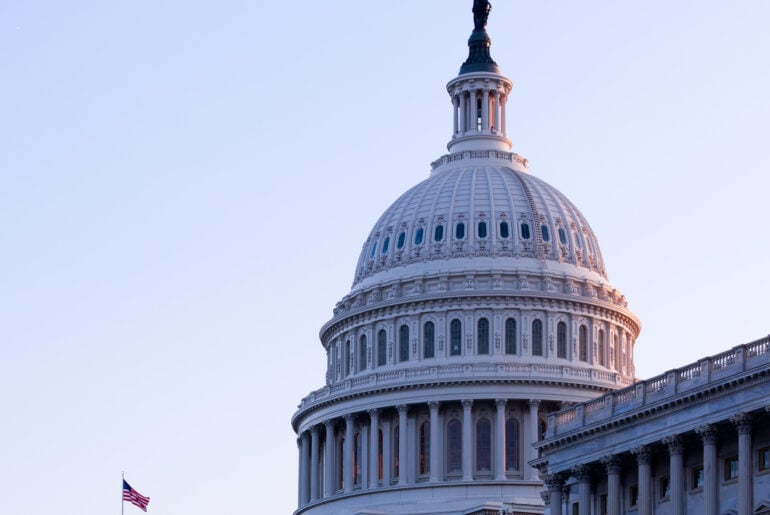In brief
On 14 April 2023, the United States Supreme Court issued its opinion in Axon Enterprise, Inc. v. Federal Trade Commission et al., and unanimously held that a litigant challenging the constitutionality of an agency administrative enforcement action need not await the outcome of that action before bringing their constitutionality challenge in federal district court.
In depth
The Court in Axon Enterprise, Inc. considered two separate matters based on administrative enforcement proceedings: one from the Securities and Exchange Commission (SEC) and one from the Federal Trade Commission (FTC).
The Securities Exchange Act and the Federal Trade Commission Act each authorize the SEC and FTC, respectively, to bring enforcement actions through civil suits in federal district courts or through administrative proceedings. Administrative matters are typically adjudicated in the first instance by an Administrative Law Judge (ALJ). A party may appeal the ALJ’s ruling to the SEC and FTC’s respective Commissions. The Commissions’ final decisions and orders are subject to further review in the federal courts of appeals.
The respondents in Axon Enterprise, Inc. were the subjects of SEC and FTC enforcement actions. Each sought to enjoin the agency actions in the United States district courts before an ALJ decision had been rendered, a departure from the applicable statutory review schemes. The respondents challenged as unconstitutional the agencies’ structure and authority to pursue the underlying administrative proceedings only to have their federal court cases dismissed for lack of jurisdiction. On appeal, the two relevant circuit courts split, with the United States Court of Appeals for the Ninth Circuit affirming the district court’s dismissal in the FTC matter, and the Fifth Circuit Court of Appeals reversing the district court’s dismissal in the SEC matter. The Court granted certiorari to resolve the circuit split.
On review, the Court concluded that requiring a litigant to complete an administrative proceeding that has been challenged as constitutionally infirm, before federal court consideration of the constitutional integrity of that proceeding, effectively results in the loss of the claimant’s right not to be subjected to an unconstitutional proceeding.
In evaluating the applicable legal precedent in this area, the Court was clear that this anticipated review of the constitutional and administrative law issues appropriately considered the adequacy of the existing statutory judicial review schemes and the agencies’ authority and expertise. Because the respondents asserted potential injury from being subject to the administrative proceedings altogether, the Court explained the statutory scheme could not provide meaningful review if they were forced to wait until after the Commission’s final order. Nonetheless, the Court noted that “[n]othing we say today portends a newfound enthusiasm for interlocutory review.” Rather, the Court specifically found that the constitutional challenges asserted, which sought to prevent the actions from going forward at all, were wholly collateral to the issues presented in the underlying enforcement proceedings. Finally, the Court noted that the district courts, and not the agencies, were best suited to evaluate issues of constitutional and administrative law, which are outside of the scope of the agencies’ expertise.
Accordingly, the Court held that district courts could review the structural and constitutional challenges to SEC and FTC’s enforcement actions under federal-question jurisdiction, reversed the Ninth Circuit’s judgment to the contrary, and remanded both underlying cases. The ultimate issue of the constitutional questions raised by each respondent remain unanswered for now.
Justices Thomas and Gorsuch each issued concurring opinions. Justice Thomas wrote separately to underscore his concern with administrative agencies’ authority to adjudicate matters implicating individual private rights with limited and deferential review from federal appellate courts. Justice Gorsuch found the district courts’ federal-question jurisdiction to be reserved expressly in the applicable statutes’ text without regard to the multi-factor court-created test that Justice Kagan, writing for the Court, employed.
Key takeaways
- The decision allows respondents subject to SEC, FTC, and likely other administrative agency adjudications to seek injunctive relief in district courts challenging the constitutional structure and authority of the agency’s administrative forum before being forced through administrative enforcement proceedings.
- While the Court emphasized that the nature of the respondents’ claims and the alleged harm were the relevant considerations in upholding the district court’s jurisdiction, it also noted that the expense and burdens of protracted administrative proceedings alone were not justifications for immediate review.
- While collateral constitutional challenges to SEC, FTC, or other agency administrative adjudications may provide an alternative vehicle for challenging agency actions, in most cases, the underlying enforcement claims likely will still be adjudicated through agency proceedings.





